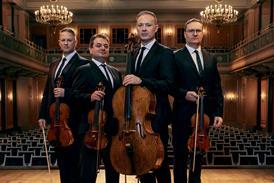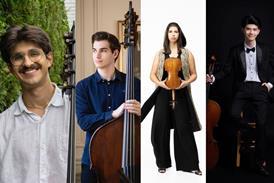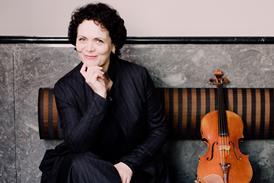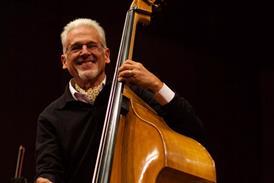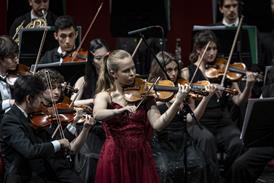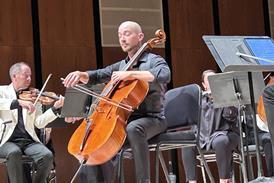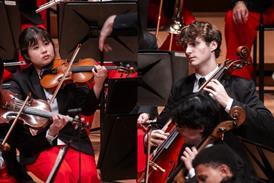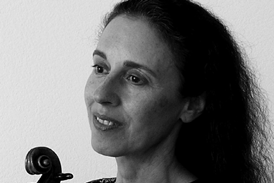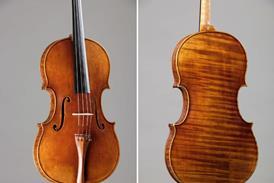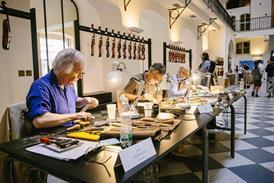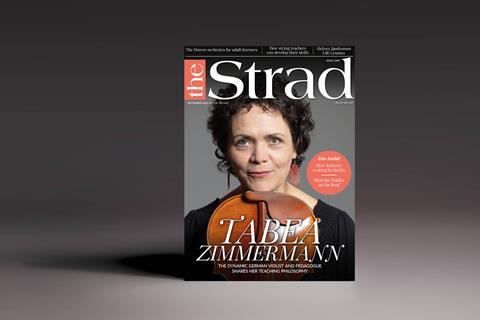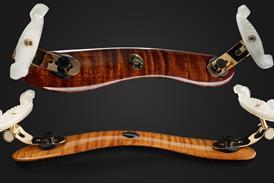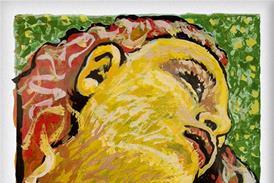Playing debates – Page 4
-
 Premium ❘ Debate
Premium ❘ DebateHistorically informed performance on modern instruments is misguided
Historically informed performance is all well and good, argues Julian Haylock, but continuing to play on modern instruments just results in the worst of both worlds
-
 Debate
DebateYoung musicians too often make musical decisions based on impressing the listener
As artists grow older they hear more in the music, says Orion Quartet violist Steven Tenenbom, who urges younger musicians to learn as much as they can from their mentors – and delve deeper into the music themselves
-
 Debate
DebateOpinion: How should a musician respond to a string breaking on stage?
Nobody can blame a musician for their string breaking on stage. But, says Charlotte Gardner, the way a performer responds is certainly within their grasp
-
 Debate
DebateShould classical artists embrace music video singles?
More core classical artists these days are mimicking their contemporaries in the pop world by releasing music video singles to accompany their albums. Charlotte Gardner asks whether this is a positive development
-
 Focus
FocusDo string players who refuse to embrace popular music face extinction?
String players must embrace the vernacular of today’s popular music or risk being consigned to a bygone era, writes electric violinist Tracy Silverman
-
 Debate
DebateWhy do string players often sound so different on disc than live?
Too many string players are unable to take ownership of their recorded sound because they lack an external perspective, says Charlotte Gardner
-
 Focus
FocusTwo ♭ or not two ♭ – on the Adagio from Bach's Violin Sonata no.1
Excessive reverence for Bach’s manuscript is leading violinists to make a mistake early in the first sonata, writes Hagai Shaham
-
 Debate
DebateWith vibrato the question isn't just about more or less, but also about variety of sound
It is a wonderfully expressive tool when used sensitively, but soloists especially should take greater advantage of the various vibrato possibilities, writes violist Hartmut Rohde
-
 Debate
DebateIs playing the viola a different art from playing the violin?
Not so, according to Philip Dukes, who argues that the technical requirements of the instruments overlap considerably and players benefit from studying both
-
 Blogs
BlogsIf you want the industry to change, you have to be willing to enact a change yourself
The violinist and co-founder of the Manchester Collective on her musical philosophy and forging new ground in an increasingly conservative music world
-
 Focus
FocusYou can only diversify the audience by having a diverse group of people on stage
Half a century since the New York Phil hired its first black musician, the percentage of black and Latino players in US orchestras remains woefully low. But some organisations are taking action towards inclusivity
-
 Blogs
BlogsTamsin Waley-Cohen: 7 tips for making a successful recording
Making a recording comes with its own special set of pressures, and moving from the stage to the studio isn’t the easiest transition for a musician to make. Here violinist Tamsin Waley-Cohen sets out her advice earned through experience
-
 Debate
DebateMake lesser-known masterpieces part of your repertoire, but only if you have something to say
It is not enough to choose pieces just because nobody else plays them, writes Francesca Dego
-

-
 Focus
FocusHow to start approaching the dense scores of New Complexity composers
In the first of a two-part guide, Pwyll ap Siôn looks at the challenges presented in performing works by composers associated with the New Complexity movement – and offers tips on how to approach the extended techniques and rhythmic difficulties involved
-
 Blogs
BlogsBecoming a better and happier musician through mindfulness and yoga
Violinists Elena Urioste and Melissa White’s musical lives have been transformed by yoga, finding both body and mind freer and more resilient against the rigours of life as a professional musician
-
 Premium ❘ Debate
Premium ❘ DebateTake the hostility out of string playing
Today's performers should remember that you don't need to be aggressive to make a searing point, argues Richard S. Ginell
-
 Debate
DebatePerforming works composed before the recording era in an 'authentic' style misses the point artistically
We will never truly know what this music sounded like, argues cellist Jeffrey Solow
-
 Debate
DebateMust all orchestral string sections sound the same?
Orchestras once boasted unmistakable musical identities, but an emotionally sanitised age has brought about a lamentable universality of sound, says Julian Haylock
-
 Debate
DebateListening to recordings can be an unhelpful way to learn well-known repertoire
The pervasiveness of YouTube has prevented many students from developing an individual voice, argues the Royal College of Music’s Mark Messenger


